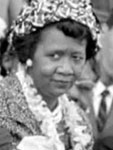Little Rock Central High School National Historic Site [AK]
The Little Rock Central High School National Historic Site preserves the site at which nine African American students entered the Little Rock Central High School for the first time on September 23, 1957. Their right to do so, determined under the 1954 Brown v. Board of Education of Topeka decision, proved a national symbol of the end of segregation in public schools. Despite the legality of the situation, desegregation was still highly inflammatory to many. The students had previously been turned away by the Arkansas State Guard before federal troops were deployed to escort them to and from the school.
The site offers interactive exhibits, captioned audio-visual programs, oral history listening stations, 30-minute guided group tours of the high school, gardens, Junior Ranger activities, Trail of Tears guided bicycle tours, student educational programs, teacher workshops for credit, school outreach presentations, and a traveling trunk. Tours of the school require two weeks advance notice, and groups must include 10 or more individuals. The high school is still in use. As a result, visitors may not tour the school without a guide. The website offers oral history videos, a pre-visit booklet, and lesson plans.
